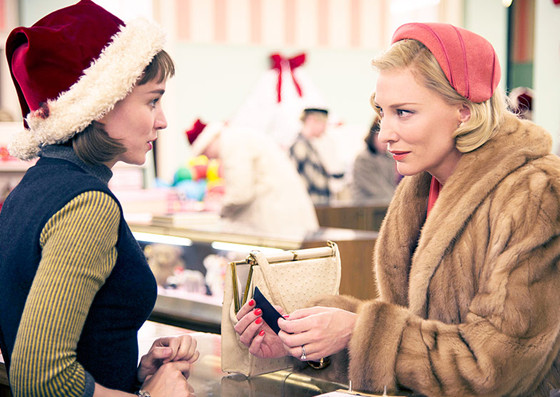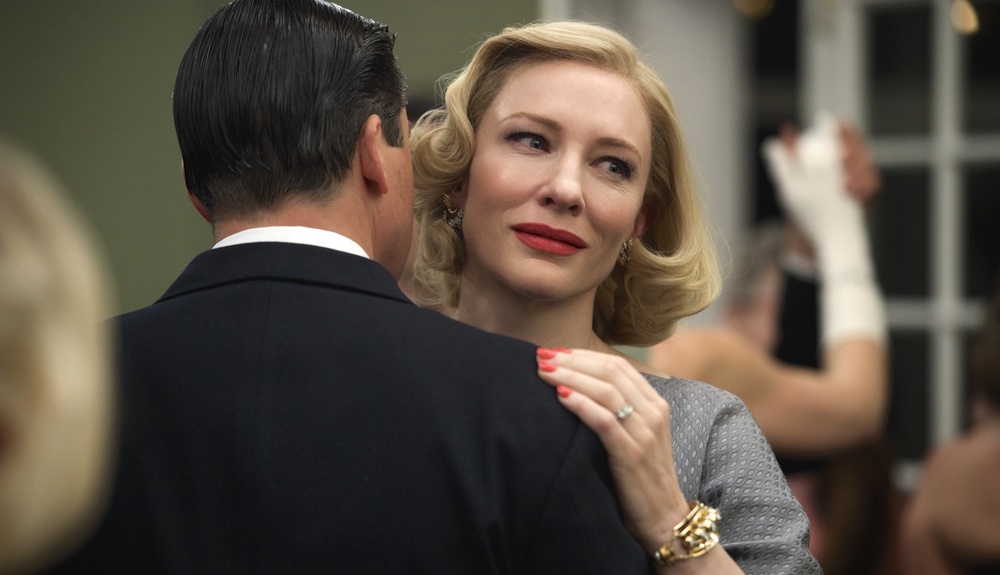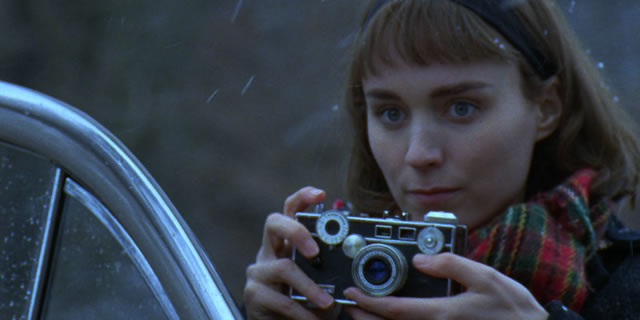
Love is a crime in Todd Haynes’ (Safe, I’m Not There) intelligent, agonizing, and incredible new film, Carol. Part revisionist melodrama and postmodernist Douglas Sirk-style weepie, Carol is adapted by Phyllis Nagy (Mrs. Harris) from Patricia Highsmith’s (Strangers on a Train, The Talented Mr. Ripley) 1952 pulp novel, The Price of Salt, itself a decidedly outré lesbian love story and the only non-crime novel she ever penned. Carol may well be Haynes most meticulously crafted, richly detailed, sumptuous and stirring work, as well as being perhaps the finest American film of the year.
Set in 1952 New York, Carol is an exquisite companion piece to Haynes’ earlier Sirkian homage/pastiche Far From Heaven (2002), minus the Technicolor and with a decidedly more somber post-war visage. Bolstered by ace cinematographer Ed Lachman (The Limey), Carol presents a more subdued color palette than Far From Heaven, sure, but it’s still intense and artful, infusing an urgency and élan to the New York backdrop that’s both elaborate and breathtaking.
“What a strange girl you are, you must be from outer space,” quips the highborn Carol Aird (Blanchette) with a delicate reserve to Therese Belivet (Rooney Mara), a plebeian shopgirl with aspirations to pursue a career in photography. Their slow burn love story, elegantly understated, unfeigned and, to no small degree, harrowing, will expertly tear apart your heart and dotingly restore it, too.

Carol’s courtship of Therese may be the crux of the film, and both Blanchett and Mara are certainly award bound for their astonishing work, but Haynes packs each frame with transgressive details, rich, relatable, amiable characters, and enough soupçon uncertainty, speculation, and risk to run a melodrama marathon. A more rewarding and expressive American film this or any year you will not likely find, for Carol conquers, despite its deceptively simple facade which perverts a cranky coolness and anticipates the liberating turmoil in store in the imminent ‘60s.
A dazzling divorcee, Carol first meets Therese while shopping for a Christmas present for her four-year-old daughter, Rindy (Sadie and Kennedy Heim). Therese’s infatuation is almost instant, and it drives a spike in the already distancing relationship she has with her stubborn boyfriend, Richard Semco (Jake Lacy).
On Carol’s side, her ex-hubby Harge (Kyle Chandler), is a heartbroken mess. Not only does he still pine somewhat for Carol—and he’s suffered her lesbian leanings in the past, apparently, and this accounts for his understandably suspicious behavior—but now he wants custody of Rindy. In the hands of a lesser filmmaker it’s easy to imagine Harge as the villain, austere and angry, but he’s quite sympathetic, even as a representative of the skewered morality of the era, Harge is often ascribable. As Carol is ostensibly a women’s picture, Harge is the threatening force for sure, but a pitiable one.
To escape Harge’s misplaced frustrations and to help her comes to terms with the potentiality of losing Rindy, Carol invites Therese on a road trip and a formalistic amour fou cautiously opens its tender boughs between them. There’s an inestimable moment shared between them when Carol first asks her if she’d like join her on the road, Therese gives the briefest pause and then she answers “Yes I would,” as it seasonably and wondrously starts to delicately snow.
Carol is an impish predator to Therese’s unaffected prey. Their liaison disentangles itself at first in stolen glances, in the hiss of an old vinyl record, a desirous smile, a shared cigarette, and a martini until, eventually, libido and salacity win out. But their mutual affections are palpable, as is their pain when parting and the ire that follows them from such a puritanical and uptight era.

In a way, Carol is a return, for Haynes, to his abandoned position as pioneer of the New Queer Cinema that cultured out of the American indie breakout phase in the 1980s. Gay themes haven’t held sway over much of Haynes oeuvre since his Jean Genet-inspired feature film debut Poison (1990), apart from traces here and there in his glam rock gambit Velvet Goldmine (1998) and there’s certainly a whisper of Oscar Wildean posturing, verbosity and wit here, particularly when Carol halfheartedly conjectures, “Just when you think that it couldn’t get any worse, you run out of cigarettes.”
Dialogue snaps and enchants, humor never absent, even when it’s time to mewl. All the disparate and analogous elements of the film combine instinctively; Carter Burwell’s music, Sandy Powell’s costumes, and Judy Becker’s immaculate production design hit all the right notes. Haynes works with the same people again and again for good reason.
An unshakable recurring visual motif in Carol rests in imagery of women trapped behind rain-streaked windows or fogged in lucarne-like frames, as though the matrons in this world are kept captive under glass. It’s an effective and vigorous conceit, making the mundane at times menacing, foreshadowing insecurity and uncertainty.
Carol insists on the impermanence of identity, a theme that can be traced through arguably all of Haynes work, and like the very best unrequited love stories, this film obeys all the matter-of-course rhythms that are required of it. Sexual politics and identity are regularly tested and thought about in cinema, but rarely with such nimble naturalism and perceptivity. Carol is a masterpiece, triumphant in both its artifice and merciless honesty, it glitters like a rare and precious stone.
Taste of Cinema Rating: 5 stars (out of 5)